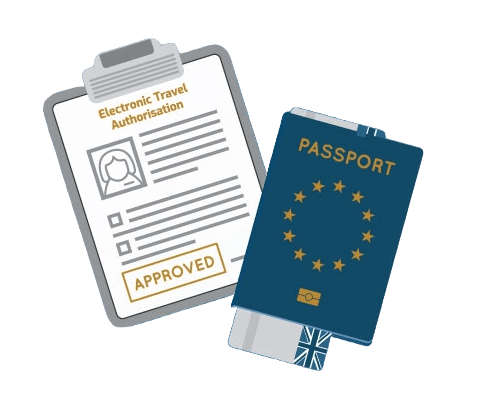
We’re here to help you understand travel requirements for entering Kenya. Cloudvisas simplifies the process of applying for the Kenya eVisa. You can use the form below and get started on your application. We will then handle the rest of the processing from there and keep you informed throughout the stages.
Get started on your application
Applying for the Kenya eVisa
What is the Kenya eVisa?
The Kenya eVisa can be used for purposes including tourism, business, or medical.
Who can travel on the Kenya eVisa?
Passport holders of the following countries can apply for the Kenya eVisa without requiring a visa from another country as a contingency: Afghanistan, Albania, Algeria, Andorra, Angola, Antigua and Barbuda, Argentina, Armenia, Australia, Austria, Azerbaijan, Bahamas, Bahrain, Bangladesh, Barbados, Belarus, Belgium, Belize, Benin, Bhutan, Bolivia, Bosnia and Herzegovina, Botswana, Brazil, Brunei, Bulgaria, Burkina Faso, Cambodia, Cameroon, Canada, Cape Verde, Central African Republic, Chad, Chile, China, Colombia, Comoros, Congo, Costa Rica, Croatia, Cuba, Cyprus, Czech Republic, Denmark, Djibouti, Dominica, Dominican Republic, East Timor, Ecuador, Egypt, El Salvador, Equatorial Guinea, Eritrea, Estonia, Eswatini, Ethiopia, Fiji, Finland, France, Gabon, Gambia, Georgia, Germany, Ghana, Greece, Grenada, Guatemala, Guinea, Guinea-Bissau, Guyana, Haiti, Honduras, Hong Kong, Hungary, Iceland, India, Indonesia, Iran, Iraq, Ireland, Israel, Italy, Ivory Coast, Jamaica, Japan, Jordan, Kazakhstan, Kiribati, Kosovo, Kuwait, Kyrgyzstan, Laos, Latvia, Lebanon, Lesotho, Liberia, Libya, Liechtenstein, Lithuania, Luxembourg, Macau, Madagascar, Malawi, Malaysia, Maldives, Mali, Malta, Marshall Islands, Mauritania, Mauritius, Mexico, Micronesia, Moldova, Monaco, Mongolia, Montenegro, Morocco, Mozambique, Myanmar, Namibia, Nauru, Nepal, Netherlands, New Zealand, Nicaragua, Niger, Nigeria, North Korea, North Macedonia, Norway, Oman, Pakistan, Palau, Palestine, Panama, Papua New Guinea, Paraguay, Peru, Philippines, Poland, Portugal, Qatar, Romania, Russia, Saint Kitts and Nevis, Saint Lucia, Saint Vincent and the Grenadines, Samoa, San Marino, São Tomé and Príncipe, Saudi Arabia, Senegal, Serbia, Seychelles, Sierra Leone, Singapore, Slovakia, Slovenia, Solomon Islands, Somalia, South Africa, South Korea, Spain, Sri Lanka, Sudan, Suriname, Sweden, Switzerland, Syria, Taiwan, Tajikistan, Thailand, Togo, Tonga, Trinidad and Tobago, Tunisia, Turkey, Turkmenistan, Tuvalu, Ukraine, United Arab Emirates, United Kingdom, United States, Uruguay, Uzbekistan, Vanuatu, Vatican City, Venezuela, Vietnam, Yemen, Zambia, Zimbabwe
Who does not need the Kenya eVisa?
All travellers will require a travel authorization to enter Kenya by air, land, or sea for tourism, business, or medical purposes.
How many days are allowed?
Eligible passport holders are permitted to visit Kenya for days. Multi-entry Kenya eVisa options are available.
How long is the Kenya eVisa valid?
The authorization is usually issued for 90 days. This can vary depending on your passport expiry date as well as the type of ETA or eVisa you apply for.
What is the processing time for the Kenya eVisa application?
The processing timeline is typically 3 days, although it is advised travelers allow extra time for any processing delays that may occur for Kenya to approve their Kenya eVisa request.
What do I need to apply for the Kenya eVisa?
Most all travel authorizations such as the Kenya eVisa, will require a passport with at least six months validity remaining. You should also have the information on-hand of your booked or potential itinerary, including arrival and departure dates, as well as accommodation details.
What are the options for applying?
Currently, there are no other variants of the Kenya eVisa.
What if I want to apply on my own?
You can apply directly by vising the following:
Paying for the authorization
What are the fees for applying?
The government fees are currently 32.50 to 160 USD yet are subject to change without notice. Our fees for processing your application are calculated and displayed at checkout.
Are the fees refundable?
Both government and service fees are required to be paid prior to submitting the application. The government fee is non-refundable. The service fee is refundable in the event the application is unsuccessful.
Using the Kenya eVisa
What entry modes do I need the Kenya eVisa?
The Kenya eVisa is needed to enter Kenya by air, land, or sea.
Do I need travel insurance to enter Kenya?
Travel insurance is not required to travel on the Kenya eVisa.
Whether or not travel insurance is required, we recommend frequent travelers to purchase a multi-trip travel insurance policy that includes Worldwide Coverage, as this allows you to use a single policy that covers all your trips. Bear in mind coverage restrictions on certain destinations and activities as well as coverage limits, terms and conditions.
Is it possible to extend a visit to Kenya on the Kenya eVisa?
Extensions of the Kenya eVisa are not possible.
Applying for the Kenya eVisa with CloudVisas
Applying for the Kenya eVisa is simple with us. It entails the following steps:
- Documentation: Ensure you have your passport, booking itinerary or potential itinerary available as well as the contact information of individuals, businesses or organizations you will stay with or interact with during your stay in Kenya.
- Application Form: Once you have your documents, the next step is to complete the application form for your selected travel authorization. Ensure you provide accurate information on the form, including biometrics, contact, personal, family, occupational, itinerary and other requested information.
- Supporting Documentation: As and when requested, upload copies of the necessary documents. Ensure your documents are in the correct and acceptable format for uploading. Also ensure the entire document is visible with key information easily readable. The information must match that of each of the applicants.
- Receive Your e-Visa: If your application is approved, your Kenya eVisa will be emailed to the address used on your application within 3 days or less. Your authorization will be electronically linked to your passport, however, travelers are advised to print out a copy of their authorization and / or download any necessary mobile applications to display their Kenya eVisa to authorities at the border, should they be requested to provide proof on arrival or departure to Kenya.
Restrictions on traveling on the Kenya eVisa
Travelers with an approved Kenya eVisa are subject to the following restrictions.
Permitted Entry Ports: The authorization allows you to enter only via approved air, land or sea ports. Entering through ports that are not approved for this type of authorization may result in denial of entry.
Working on the Kenya eVisa: The Kenya eVisa cannot be used for work purposes, unless explicitly authorized through another program or visitor work scheme.
Immigrating on the Kenya eVisa: The Kenya eVisa cannot be used for immigrating or establishing residency. If you wish to reside on a long-term basis, you will need to apply for the relevant Kenya visa.
Passport validity: Your passport must be valid for at least 6 months prior to submitting your application for the Kenya eVisa. You must travel on the passport that you use for your application. Should your passport have less than 6 months validity prior to expiry, you should consider obtaining a new passport prior to applying for the Kenya eVisa.
Multiple citizenships: You must disclose all citizenships you hold on your Kenya eVisa application. Not disclosing these citizenships may result in a denial of your application.
Accompanying minor children: Parents or guardians traveling with minor children may be asked for documentation at the border, and during the Kenya eVisa process. Parents or guardians should ensure they carry sufficient documentation to provide proof of their relationship to the minor traveler.
Approved points of entry on the Kenya ETA
The Kenya ETA allows travelers from eligible countries to enter Kenya through any of its airports, land border crossings, or seaports. This flexibility ensures that visitors can choose the most convenient entry point for their travel plans, whether arriving by air, road, or sea.
Permitted Airports
Kenya’s international airports are equipped to welcome travelers with a Kenya ETA. These hubs offer seamless entry for visitors arriving by air, ensuring convenience and efficiency for all travel purposes.
| Name | City | State/Region | Description |
| Jomo Kenyatta Intl Airport | Nairobi | Nairobi County | The largest airport in Kenya, serving as the main international gateway. |
| Moi Intl Airport | Mombasa | Mombasa County | Serves coastal Kenya and popular tourist destinations like Diani Beach. |
| Eldoret Intl Airport | Eldoret | Uasin Gishu | Key airport in western Kenya, popular for agricultural and business travelers. |
| Kisumu Intl Airport | Kisumu | Kisumu County | Located near Lake Victoria, ideal for accessing western Kenya. |
| Wilson Airport | Nairobi | Nairobi County | Handles domestic and regional flights, often for safari destinations. |
| Malindi Airport | Malindi | Kilifi County | Serves the coastal town of Malindi and surrounding areas. |
| Ukunda Airport | Ukunda | Kwale County | Gateway to Diani Beach, a top coastal destination. |
| Wajir Airport | Wajir | Wajir County | Supports travel to northern Kenya and regional trade. |
| Lokichogio Airport | Lokichogio | Turkana County | Known for humanitarian flights to South Sudan and northern Kenya. |
| Nanyuki Airport | Nanyuki | Laikipia County | Entry point for travelers heading to Mount Kenya and nearby reserves. |
Land Border Crossings
Kenya’s land border crossings provide flexible entry options for ETA holders arriving by road from neighboring countries, supporting smooth travel throughout East Africa.
| Name | City | State/Region | Description |
| Namanga Border | Namanga | Kajiado County | Popular crossing for travelers heading to Tanzania and the Serengeti. |
| Busia Border | Busia | Busia County | Major crossing between Kenya and Uganda, near Lake Victoria. |
| Malaba Border | Malaba | Bungoma County | Frequently used crossing for travelers between Uganda and Kenya. |
| Lunga Lunga | Lunga Lunga | Kwale County | Southern border crossing into Tanzania near the coast. |
| Taveta Border | Taveta | Taita Taveta County | Connects Kenya and Tanzania near Mount Kilimanjaro. |
| Moyale Border | Moyale | Marsabit County | Northern border crossing to Ethiopia, popular for trade routes. |
| Isebania Border | Isebania | Migori County | Used for travel between Kenya and Tanzania in the western region. |
| Mandera Border | Mandera | Mandera County | Connects Kenya with Ethiopia and Somalia in the northeast. |
| Liboi Border | Liboi | Garissa County | Small crossing near the Kenya-Somalia border. |
| Suam Border | Suam | Trans-Nzoia County | A less-trafficked crossing between Kenya and Uganda, near Mount Elgon. |
Permitted Seaports
Seaports in Kenya accommodate travelers arriving by sea, including cruise passengers and private yachts, offering efficient entry processes along the stunning coastline.
| Name | City | State/Region | Description |
| Port of Mombasa | Mombasa | Mombasa County | Largest seaport in East Africa, handling cruise ships and private vessels. |
| Lamu Port | Lamu | Lamu County | Gateway to the historic Lamu Archipelago, a UNESCO World Heritage site. |
| Kilifi Port | Kilifi | Kilifi County | Supports smaller vessels and private yachts along the coast. |
| Malindi Port | Malindi | Kilifi County | Entry point for small cruise ships and leisure travelers. |
| Mtwapa Creek | Mtwapa | Kilifi County | Popular for private yachts and leisure craft. |
| Shimoni Port | Shimoni | Kwale County | Connects travelers to Wasini Island and dhow cruises. |
| Funzi Bay | Funzi | Kwale County | A serene coastal entry point for private vessels. |
| Port Reitz | Mombasa | Mombasa County | Handles passenger and cargo vessels in the Mombasa area. |
| Kiunga Port | Kiunga | Lamu County | Remote port near the Somali border, used for small-scale trade and private entry. |
| Vanga Port | Vanga | Kwale County | Small seaport near the Tanzanian border, ideal for local travel. |
Financial sufficiency requirements for entering Kenya
Travelers entering Kenya on an ETA must demonstrate adequate financial resources to cover their stay. This requirement ensures that visitors can manage their travel expenses without burdening the local economy or requiring external financial support.
Proof of Financial Resources
Visitors are typically required to show evidence of sufficient funds to cover their accommodation, meals, transportation, and other personal expenses during their stay. Acceptable proof may include:
- Bank statements: Showing consistent activity and an adequate balance for the duration of the trip.
- Pay slips or income proof: Demonstrating regular income to support travel expenses.
- Credit card statements: Indicating available credit limits that can fund the visit.
Recommended Amounts
While Kenya does not specify a universal minimum amount for all visitors, it is advisable to have at least $50 per day to cover basic costs. For travelers staying in higher-end accommodations or participating in premium activities such as safaris, a higher amount may be necessary.
Payment Methods Accepted in Kenya
While preparing for financial sufficiency, it’s useful to know the common payment methods in Kenya:
- Cash in Kenyan Shillings (KES): Widely accepted, particularly in rural areas or local markets.
- Credit and Debit Cards: Major cards like Visa and Mastercard are commonly accepted in urban centers, hotels, and restaurants.
- Mobile Money (e.g., M-Pesa): A popular and reliable payment option for both locals and tourists in Kenya. Setting up M-Pesa access while in Kenya can make transactions easier.
Presenting Proof at Immigration
Immigration officials may request proof of financial sufficiency upon arrival. It is advisable to carry physical or digital copies of financial documents for inspection. Having neatly organized documents can speed up the verification process and ensure a smooth entry experience.
Penalties for Non-Compliance
Travelers unable to demonstrate financial sufficiency may face:
- Denial of entry at the border.
- Possible deportation if discovered during their stay without adequate means of support.
- Entry bans or flags on future ETA applications.
Additional Financial Considerations
- Prepaid Expenses: Travelers with pre-booked and paid accommodations, tours, or transport can reduce the required amount for daily expenses.
- Travel Insurance: Comprehensive travel insurance with coverage for emergencies is recommended and may be requested as proof of financial preparedness.
- Family or Group Travel: If traveling with dependents, sufficient funds must cover the expenses of all group members.
Local laws impacting tourists or business travelers
When visiting Kenya, understanding and respecting local laws is essential for a safe and enjoyable stay. Both tourists and business travelers must adhere to specific legal and cultural norms to avoid fines, penalties, or misunderstandings.
Dress and Behavior
While Kenya is relatively liberal, modest dress is recommended, particularly in rural and Muslim-majority areas such as the coastal regions. Avoid wearing clothing that could be considered offensive or inappropriate.
- Public displays of affection (PDA) are culturally discouraged, especially outside urban areas.
- Avoid political discussions or actions that may be seen as controversial or inflammatory.
Business Conduct
For business travelers, adherence to Kenya’s corporate laws is crucial:
- Work Permits: Engaging in employment or business without the appropriate work permit is illegal.
- Corruption Laws: Kenya has anti-bribery and anti-corruption laws. Offering or accepting bribes can lead to severe penalties.
Environmental Regulations
Kenya’s ban on single-use plastics, particularly in national parks and beaches, is strictly enforced. Travelers should avoid carrying or using plastic bags, as possession can lead to fines. Supporting eco-friendly practices, such as reusable bags, aligns with local conservation efforts.
Laws on Wildlife and Conservation
Kenya has strict laws to protect its rich biodiversity and wildlife. Tourists must:
- Avoid purchasing or transporting ivory, animal products, or artifacts derived from protected species.
- Follow park regulations, including staying in designated areas and avoiding feeding or disturbing animals.
- Refrain from littering or damaging natural habitats in protected areas, which is punishable by fines or legal action.
Photography Regulations
Kenya has specific restrictions on photography, particularly in sensitive areas. Taking photographs of government buildings, military installations, airports, and police officers is strictly prohibited and can result in fines, arrest, or confiscation of equipment. Always seek permission before photographing individuals, especially in rural areas, as some communities may find it intrusive or offensive.
Driving and Road Safety Laws
For tourists planning to drive, Kenya enforces left-hand traffic and requires an international driving permit (IDP). Seatbelts are mandatory, and strict penalties exist for driving under the influence of alcohol. Traffic laws are actively enforced, especially in urban areas, to ensure road safety.
Alcohol and Smoking Regulations
Kenya enforces specific laws regarding alcohol consumption and smoking to ensure public order and health. The legal drinking age is 18, and public intoxication is discouraged, with strict rules against consuming alcohol in non-designated areas. Smoking is prohibited in public spaces unless within designated smoking zones, and violations may lead to fines or other legal penalties.
Penalties for Drug-Related Offenses
Kenya has zero-tolerance laws for drug possession, trafficking, or use. Travelers caught with illegal substances face harsh penalties, including imprisonment.
Cultural Information about Kenya
Kenya is a nation rich in cultural diversity, shaped by over 40 ethnic groups, vibrant traditions, and a deep connection to its natural heritage. Understanding the cultural nuances of the country not only enhances the travel experience but also fosters respect and meaningful interactions with locals.
Language and Communication
Kenya’s linguistic diversity reflects its rich cultural heritage, with English and Swahili serving as the primary means of communication.
- Official Languages: English and Swahili are Kenya’s official languages and are widely spoken across the country.
- Use of English: Primarily used in business, formal settings, and government communications.
- Use of Swahili: Dominates casual conversations and acts as a unifying language for Kenya’s diverse communities.
- Basic Phrases: Learning key Swahili phrases such as “Jambo” (hello) or “Asante” (thank you) fosters connection and goodwill.
- Non-Verbal Communication: Friendly handshakes and warm smiles are common gestures of respect and politeness.
Traditions and Customs
Kenyan traditions are deeply rooted in community, respect for elders, and hospitality. Visitors are often welcomed warmly, with tea or food as a gesture of goodwill. Many ethnic groups, such as the Maasai and Kikuyu, have unique customs involving traditional attire, music, and dance. While observing these,
Cuisine
Kenyan cuisine reflects its diverse heritage, with staples like ugali (cornmeal porridge), nyama choma (grilled meat), and chapati (flatbread). Meals are often communal, emphasizing shared experiences. Coastal cuisine, influenced by Indian and Arab traditions, includes dishes like pilau and samosas, which are rich in spices and flavor.
Religion and Beliefs
Kenya is predominantly a religious country, with Christianity being the most widely practiced faith, followed by Islam, particularly in the coastal regions. Traditional African beliefs remain significant in some communities, blending with modern religions to create a unique spiritual landscape. Visitors should be mindful of religious practices and dress modestly when visiting places of worship.
Festivals and Celebrations
Kenya’s vibrant festivals and national holidays showcase its rich heritage, bringing communities together through music, art, and tradition.
- Cultural Festivals: Celebrate Kenya’s traditions, art, and music, reflecting the unique identity of its communities.
- Lamu Cultural Festival: Highlights the rich Swahili culture of the coastal region with traditional dances, dhow races, and crafts.
- Lake Turkana Festival: Showcases the heritage of the communities living around Lake Turkana through music, food, and storytelling.
- Maasai Mara Migration Festival: Honors the famous wildebeest migration and Maasai traditions, featuring cultural performances.
Etiquette and Social Norms
Politeness and respect are highly valued in Kenyan society. When greeting someone, a handshake accompanied by a warm smile is customary. Addressing elders and authority figures respectfully is important, as is avoiding overly casual behavior in formal settings.
Travel Information about Kenya
Kenya is a top travel destination, known for its breathtaking landscapes, diverse wildlife, and rich cultural heritage. Whether you’re visiting for a safari adventure, beach getaway, or cultural exploration, understanding key travel information can help you make the most of your trip.
Best Time to Visit
Kenya experiences two distinct rainy seasons: the long rains from March to May and the short rains from October to December. The best time to visit is during the dry seasons (January–March and June–October) when wildlife viewing is at its peak, especially in national parks like Maasai Mara and Amboseli.
Transportation
Kenya offers various transportation options for getting around:
- Matatus: Colorful minibusses that are popular for short trips but may be overcrowded and lack fixed schedules.
- Private Cars and Taxis: A reliable option for urban travel or visiting remote areas, especially with hired drivers.
- Trains: The SGR (Standard Gauge Railway) connects Nairobi and Mombasa, providing a scenic and affordable option.
Popular Destinations
Kenya boasts a wide range of attractions for all interests:
- Masai Mara National Reserve: Famous for the Great Wildebeest Migration and iconic safaris.
- Mount Kenya: Africa’s second-highest peak, ideal for trekking enthusiasts.
- Diani Beach: A pristine coastal paradise for relaxation and water sports.
- Lamu Island: A UNESCO World Heritage Site steeped in Swahili history and culture.
- Nairobi National Park: A unique wildlife park located just outside the capital city.
Health and Safety
- Vaccinations: Yellow fever vaccination is recommended, and malaria prophylaxis is advised for certain regions.
- Health Precautions: Drink only bottled or boiled water and avoid street food in unfamiliar areas to minimize health risks.
- Safety Tips: Exercise caution in crowded areas, avoid displaying valuables, and follow local travel advisories.
Connectivity and Internet
Kenya offers reliable communication services, making it easy to stay connected. Safaricom and Airtel are the leading mobile providers, offering prepaid SIM cards with affordable data plans. Wi-Fi is readily available in urban hotels, cafes, and restaurants, though connectivity may be limited in rural areas. The country uses 240V electricity with Type G plugs (like the UK), so travelers should bring a universal adapter if necessary.
Emergency Contacts
- Emergency Numbers: Dial 999 or 112 for police, medical, or fire services.
- Embassy Support: Keep your country’s embassy contact details on hand for any emergencies.
- Local Assistance: Many hotels and lodges have 24/7 front desk services to assist in emergencies.
Additional travel considerations
- Check your eligibility before applying
- Never overstay on the Kenya eVisa
- Apply in advance
- Travel with same passport
- Travel with copy of authorization
Get started on your application
Why use CloudVisas?
We are a technology first, application assistance and processing company that is committed to offering a superior level of service compared to embassies or governments. Our focus is on achieving the highest level of customer satisfaction.

Experience
With years of experience in online visa services, we recognize the complexities and challenges. Our team provides swift, friendly, and expert assistance to make the process as seamless as possible. We help reduce errors and expedite applications to result in a better outcome for our customers.

Simplicity
Is to be the primary go-to provider of streamlined visa services for individuals and businesses who lack the time or resources to figure out the application process themselves. Our aim is to eliminate the confusion and stress commonly associated with visa or electronic travel authorization application processes by utilizing technology and the power of our dedicated customer services team.

Value
Here’s why we are selected by travelers:
• 24/7 Support from real humans, not AI
• Pre-Submission Application Review
• Free Resubmissions for mistakes or updates
• PDF Confirmations for ease of record keeping
• Lifetime Retrievals of your approvals
• Refunds when applications are denied

